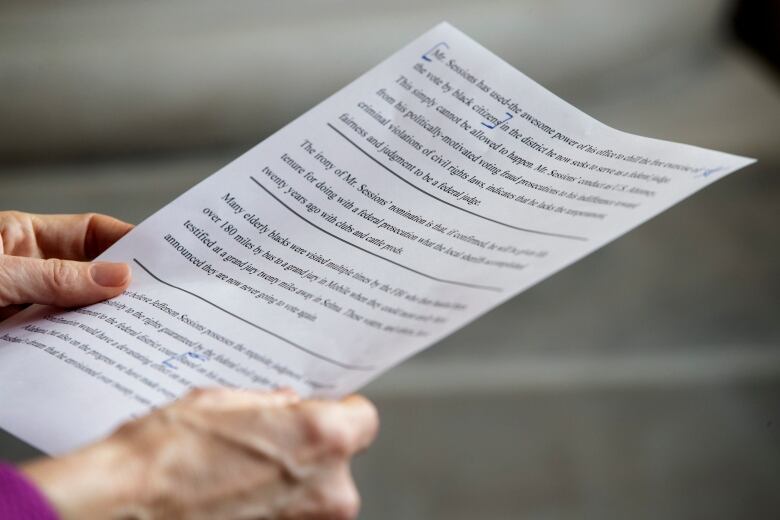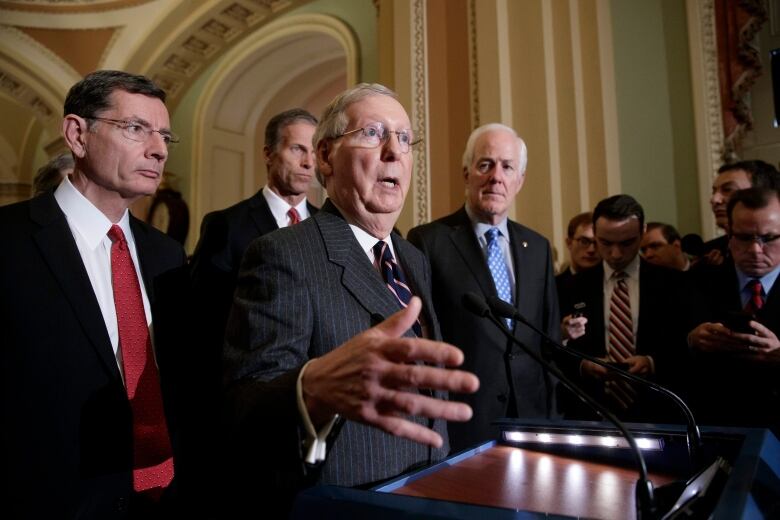'Payback': After Republicans silence Elizabeth Warren, Democrats might be in for 'parliamentary warfare'
Expect arcane rules to come out during 'exciting parliamentary warfare'

In the nearly-empty Senate on another late night of debate, Elizabeth Warren looked startled by the interruption.
The Democratic senator from Massachusetts read froma 1986 letter by the late civil-rights activist Coretta Scott King that was critical of the race record ofAlabama senator Jeff Sessions, the next U.S. attorney general.
Soon after she had finished quoting from the letter but was still speaking,three cracks of a gavel cut her off. Warren was on the brink of violating Rule 19 by "impugning" a fellow senator, she was told, a reference to an obscure decorum rule enacted because of a 115-year-old fist fight.

"I don't think I quite understand," Warren protested, reasoning that the letter by King, the widow of Martin Luther King, Jr., was entered into the record three decades ago. It accused Sessions, then up for a federal judgeship, of using his power to "chill the free exercise of the vote by black citizens."
What came next for Warren was a surprise. Warnings about Rule 19 come and go, but the order is seldom enforced. This time was different.
After less than 30 minutes of further debate, she was interrupted again bySenate Majority LeaderMitchMcConnell.
"The senator will take her seat," declared Montana Republican Steve Daines, who was presiding over the Senate during the Tuesday confirmation debate. A 49-43 vote, purely on party lines, shut her down for good.
And so Warren was silenced.
It was an extraordinarily rare rebuke. But it may have been just a preview of the parliamentary lengths that a newly empowered but frustrated Republican Senate might go to in order to bust through the Democratic obstruction ahead.
'Parliamentary warfare'
Expect the Republicans to draw on these tactics more, say Senate experts, particularly in a Republican-dominated chamber whose minority powers have been weakened ironically, by the Democrats themselves.
"What we're seeing is a reflection of the political climate, when Democrats are using all the rules available to them to obstruct," says Rachel Bovard, director of policy services at the conservative Heritage Foundation.
"This is actually pretty exciting parliamentary warfare to watch."
Democrats have intentionally delayed confirmations for U.S. President Donald Trump's cabinet picks through late-night debate and by boycotting committee votes.

"Which is, of course, their right under the rules," Bovard says. "But you're now seeing McConnell pushing back. He's saying if you're using the rules to punish us, when you step out of line, we'll do the same."
A warning shot to Democrats
Bovard notes that McConnell might have ordinarily let Warren's speech slide. In the larger context of the battle between the parties, though, barring her from debating Sessions' nomination sends a warning shot to Democrats about causing gridlock.
McConnell needs to show his Republicans he's doing something, and given her progressive base Warren is the best person with whom to do so, says Vincent Eng, an expert on Senate confirmations.
Eng says an element of "payback" may also be at play as Republicans consider a rule change once used against them to unblock president Barack Obama's nominations.

Frustrated Democrats four years ago invoked the filibuster-busting"nuclear option,"which lowered the threshold to advance confirmation votes for most presidential nominations, bringing it down to a simple majority of 51 votes. Before then, a 60-vote supermajority was needed to invoke "cloture," or stop a filibuster, in order to allow confirmation votes to proceed for judicial and executive-office posts.
The irony of the Senate power balance today? As McConnell put it in 2013: "I say to my friends on the other side of the aisle, you'll regret this. And you may regret it a lot sooner than you think."
That day has apparently arrived. Bovard notes that a self-serving rule change for the Democrats "has come back to bite them" now that they find themselves in the minority. (There are 52 Republican members,46 Democrats and two independents in the Senate.)
"They have no other ways to slow down Trump's cabinet," Bovard says. "It's their own fault."

Worth Hester, who specializes in congressional procedures with the Government Affairs Institute at Georgetown University, has little doubt the Democrats regret triggering the nuclear option in light of their current opposition to Trump's nominees.
"But it did help their party's president at the time," he says. "And to be fair, there were Democrats saying 'No, no, we shouldn't do this,' if for no reason other than we could eat it in another cycle with a Republican Senate and Republican President."
Filibuster still possible
Supreme Court appointments can still be filibustered in the Senate, and Democrat Jeff Merkley of Oregon has said he intends to use the stall tactic.
If that happens to Trump's supreme court pick Neil Gorsuch, the president has some guidance for the Senate Majority Leader: "Mitch, go nuclear."
Tempting though itmay be to go that route, Gorsuch is considered a status-quo replacement in the mold of conservative Justice Antonin Scalia. The next Supreme Court pick might be a higher-stakes fight.
- Donald Trump says court deciding on travel ban is 'so political'
- Trump picks conservative Neil Gorsuch as Supreme Court nominee
The Democrats may want to hold off on filibustering, lest they trigger the nuclear option and turn the upper chamber into a reactionary body without a strong minority to temper the majority rule. (That would go against Founding Father James Madison's idea of the Senate as a saucer to cool hot tea from the "fickleness and passion" of the House.)
For now, McConnell's rebuke of Warren is the flexing of a parliamentary muscle coming after "the culmination of frustration over two days of Democratic talk-a-thons," says Jennifer Duffy, editor of the Cook Political Report.
Worse has arguably been said before between senators without a formal reprimand.
"Democrats are crying crocodile tears over the fact that Rule 19 wasn't invoked against [Republican senator] Ted Cruz when he called McConnell a liar" on the Senate floor, Duffy says. "Democrats could have called for it and didn't, so there's politics at play on both sides."
Meanwhile, McConnell's muzzling of Warren may have been an inadvertent blessing. After she was cut off, Warren went into another room in the Capitol to finish reading King's letter, broadcasting it on Facebook Live and generating more than 5.2 million views.
In his defence of invoking Rule 19 against her, McConnell told the Senate: "She was warned. She was given an explanation. Nevertheless, she persisted." His words launched a bevy of internet memes, becoming a feminist rallying cry.
In the spirit of partisan pendulum swings, McConnell's move may have elevated Warren's message. The Washington Post had a similar take on the situation. In a Wednesday newsletter, it included a new headline: "Mitch McConnell gives Elizabeth Warren's 2020 presidential campaign an in-kind contribution."












_(720p).jpg)


 OFFICIAL HD MUSIC VIDEO.jpg)
.jpg)



























































































